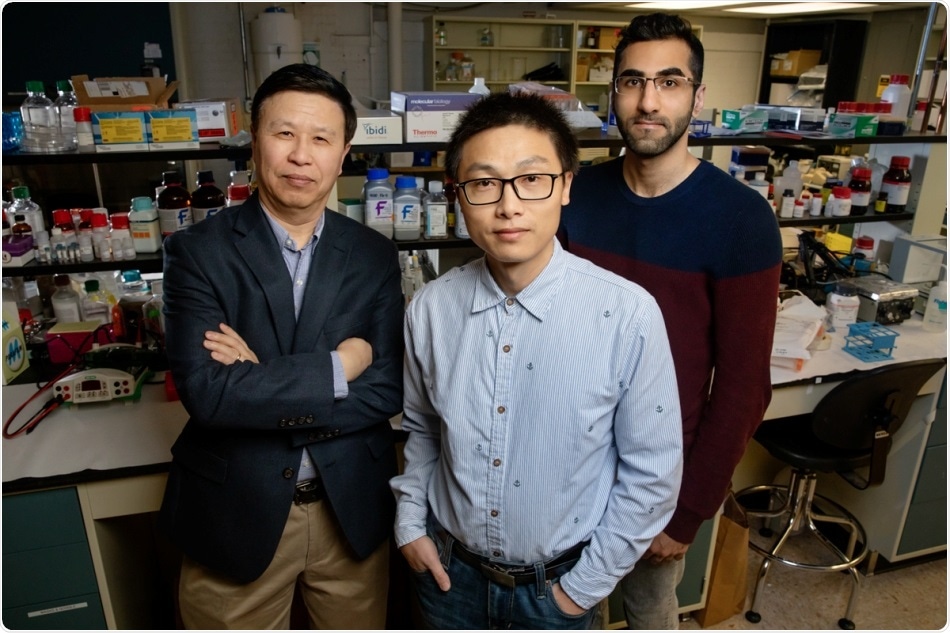A new study reports that cells tend to increase gene expression as a response to physical forces alone.
According to the team, the initial step in the production of proteins—gene activation—begins within 1 ms once a cell gets stretched, which is hundreds of times faster than chemical signals can travel.

Researchers, including, from left, Ning Wang, a professor of mechanical science and engineering; postdoctoral fellow Jian Sun; and doctoral student Erfan Mohagheghian discovered that mechanical forces on cells can boost gene expression in the nucleus. Image Credit: L. Brian Stauffer
The researchers investigated biologically relevant forces, which are analogous to those exerted on human cells by breathing, vocalizing, or exercising. The study outcomes were published in the Science Advances journal.
We found that force can activate genes without intermediates, without enzymes or signaling molecules in the cytoplasm. We also discovered why some genes can be activated by force and some cannot.”
Ning Wang, Mechanical Science and Engineering Professor, University of Illinois
In contrast to earlier findings that certain genes are vulnerable to physical manipulations of cells, Wang and his team were the first to prove that stretching cells alone could influence the expression of such genes.
Initially, the researchers demonstrated this phenomenon using genes they inserted in cells. This study has discovered that it is possible to activate even naturally occurring genes by stretching.
Scientists observed that special DNA-related proteins named histones play a significant role in whether gene expression ramped up in response to forces that cause cell stretching.
Histones regulate DNA by coiling it up to pack it in the nucleus of the cell. A class of histones called histone H3 seems to prevent gene expression in response to force upon methylating at an amino acid called lysine 9. During methylation, a molecular tag called a methyl group is added to a molecule.
The researchers noticed that H3K9 methylation was highest at the boundary of the nucleus and mostly absent from the interior, rendering the interior genes more responsive to stretching.
The genes near the nuclear periphery cannot be activated even if you stretch them, whereas the genes that are close to the center can be activated by stretching. This is because the H3K9 histones at the periphery are highly methylated.”
Ning Wang, Mechanical Science and Engineering Professor, University of Illinois
The researchers identified that it was possible to inhibit or enhance the force-responsive gene expression by ramping up or reducing H3K9 histone methylation.
Besides, the team investigated whether the gene expression was affected by the frequency of an applied force. Cells were found to be most responsive to forces with frequencies of nearly 10–20 Hz.
According to the researches, “Living cells in the human body experience forces of various frequencies (for example breathing, heartbeats, walking, running, jumping and singing), typically ranging from 0.2 hertz to hundreds of hertz.”
The team identified that at higher frequencies, cells turned rigid and the enzymes that guided gene transcription could not adhere to the DNA.
Cells’ immediate responsiveness to force makes sense from an evolutionary perspective. Cells must be able to respond quickly to things in their environment so they can survive.”
Ning Wang, Mechanical Science and Engineering Professor, University of Illinois
The National Institutes of Health financially supported this study.